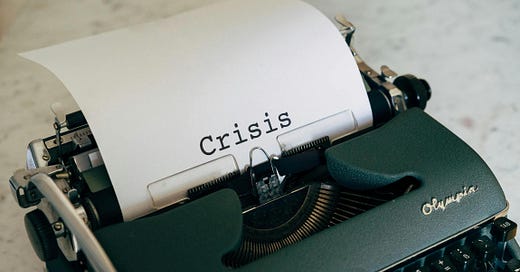My best moves to overcome the shame game
Navigating writer's doubt to find your voice
Hey there,
So, let’s kick this week off by talking about something we all face but rarely discuss.
Those shame gremlins who haunt our writing moves. 👺
Last week, on Substack Notes, I asked, "Where do you feel shame around your writing?" Some responses felt like the usual suspects, but others were more intimate:
→ feels reluctant to admit she enjoys writing fiction. 🤔 (She has a PhD in Anthropology and is a full-time researcher about how work is changing. Go figure!)
→ feels it about her consistency and commitment
→ and struggle with imposter syndrome
→ Damien also worries about getting facts wrong
Sounds familiar, doesn't it?
Today, let's unpack this shame baggage and leave you with a few practical ways to lighten your load.
The Cringe Factor
had an interesting one, "I have a kind of low-grade shame about the mostly casual/upbeat/cheerleader style of my writing. I can't explain this, but it keeps lurking. Things that are happy are considered frivolous, which IS weird because isn't happiness what we all want?"
As someone who knows Jamie’s newsletter, Inner Wilderness Unlimited (and loves her writing), I also know she's been a successful, professional content writer for decades.
That means she's spent years writing in other people’s voices for other people’s businesses about topics she probably wasn’t too passionate about. Now she's writing for herself, rediscovering her natural voice - and allowing herself to experiment. (Check out her light-hearted recent post, Where do you look for magic? )
Her Substack can be so delightful that my spidey senses tell me she may be judging herself harshly for–dare I say it–letting it feel natural and fun.
“For shame, Jamie,” that gremlin may be hissing over her shoulder, “If it’s serious work, it should be difficult.”
Perhaps she’s finding her flow. Take heart, folks, because I did a little digging and found what a few famous writers have to say about this…
The Dirty Water Phase
Ed Sheeran once said, "When you turn on an old tap, it runs out dirty water for a while before clean water starts flowing. Songwriting and doing gigs is like that. You have to keep the tap on and let the dirt flow out until clean water comes in." (Insert writing writing and publishing:)
Taylor Swift echoes this, noting that she needs about a year of writing songs between albums because her first new songs often sound too much like the previous album. It takes time to find fresh inspiration.
My point?
That initial "dirty water" phase is normal. Necessary, even. And when you do hit the clean water flow (like Jamie has), you may still be listening to the critical gremlin on your shoulder.
The Taste Gap
Ira Glass nails this concept in one of my favorite quotes:
"What nobody tells people who are beginners–and I really wish someone had told this to me . . . is that all of us who do creative work get into it because we have good taste. But there is this gap. For the first couple of years, you make stuff, and it's just not that good. It's trying to be good; it has potential, but it's not. But your taste, the thing that got you into this game, is still killer. And your taste is why your work disappoints you."
His solution? Keep writing. It's the only way to close that gap.
In Subtle Maneuvers (Mason Curry’s excellent Substack), he quotes Hanif Abdurraqib, a MacArthur "Genius Grant" recipient, who offers this insight:
"I see people talking about this idea of growth, and it has to be paired with a disdain for the work that one created before they grew. And I think I've avoided that by understanding that I did the best I could with what tools I had, and because I wrote that book, I was able to grow and write something else."
That’s the key. Do the best you can with the tools you have. Then, as you grow, your toolbox expands.
It’s a crucial mindset shift. 🙄
Instead of cringing at your past work, try seeing it as a necessary step in your evolution as a writer. Each piece you write, no matter how imperfect, is a building block in your career.
Remember, writing is about the gradual honing of your craft. Every word you put on the page is practice, even if it never sees the light of day.
Because the learning never stops, every bestselling author faces new challenges with each book.

Build a Support System
Once you're doing the work, the next crucial ingredient is a solid support system. As Brené Brown says in "Daring Greatly," the antidote to shame is empathy.
When you're in a shame spiral, try these counterintuitive moves:
1. Reach out to a trusted friend. Connection beats isolation every time.
2. Talk to yourself like you'd talk to a dear friend.
3. Own your story. As Brown says, "If we own the story, we get to narrate the ending." (Perfect advice for a writer—the whole experience is your story, so you can decide how to end your shame spiral.)
But what does a support system really mean for writers?
It's about creating a network of people who understand the writing journey, with all its peaks and valleys. If you’re discerning, these folks will celebrate your wins, commiserate over your rejections, and remind you why you picked up the pen in the first place.
It might include other writers, but it can be broader than that. Readers, mentors, and other artistic friends who respect your craft can all play a part. The key is to surround yourself with people who encourage your growth, challenge you, and provide a safe space to be vulnerable about your struggles.
Remember, a support system is a two-way street. Be the kind of support you want to receive. Offer encouragement to others and share resources. Celebrate others' successes. Not only does this create good writing karma, but it also reinforces the idea that we're all in this together.
This can ultimately be your lifeline when the shame gremlins come knocking. It reminds you that you're not alone and your voice matters - even on the days when you're not so sure yourself.
My Personal Take
When I started this Substack, it felt like my only readers were my cousins and a few friends. Showing up week after week was tough, but I treated it as practice. Consistency became as important for my writing as it was for attracting new subscribers.
So, the most important things you can learn are to give yourself grace, self-acceptance, and find the proper support. (This is great life advice, too.)
Imagine all those judgments you’ve put on yourself are like a backpack, and now you can take it off to lighten your load.
👏 Phew—thanks Jen!👏
So, fellow writers, what shame gremlins are you wrestling with? How do you push through? Drop a comment below - let's lift each other up this week.
Keep going,
Jen
P.S. Thursday I’ll be holding an afternoon chat about this. It’s a great place to start building your support system. Look out for the notification in your inbox. Last week’s chat was fun!







Oh, Jen! You know this topic speaks straight to my writer's heart. And I'm blushing over here - you're too kind. I love that you're tackling this topic head on because dragging it out into the light is the only way we'll ever get to see it for what it really is (and move past it!). Your insight into my situation is pretty amazing. I hadn't ever thought about it that way, but - no surprise - you cut right to the core of the issue. Seriously, I feel like I've just been the recipient of a really powerful writer's therapy session! Thank you. Thank you. Thank you. I hope I can make Thursday's chat!
Jen,
Such an important piece. Thanks for writing about shame and writing. Insightful compelling, and helpful !